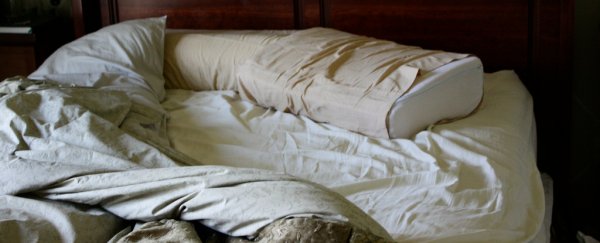There are generally two types of people in this world - those who can't start the day without a freshly made bed, and the rest of us, who don't really get the point of fixing all your sheets nicely just to mess everything up again in 18 hours. Those in the latter group, rejoice, because science has found that a messy bed might actually be better for your health.
That's because dust mites - the little microscopic critters that trigger asthma and allergies in some people - thrive in the humid, warm conditions of a neatly made bed, but dry out when the blankets are left thrown off.
If you just ran to your bedroom and ripped the doona off in disgust, don't panic. Dust mites are a natural part of our lives, and right now there are probably around 1.5 million of them living in your bed, feasting on your old skin cells. That's pretty gross, but for most of us it's not really an issue, as we'll never notice our tiny cohabitors.
But there are a lot of people out there who are allergic to substances produced by dust mites - often without realising it - and for them, the little bugs can trigger ongoing coughing, sneezing, itchy eyes and asthma. These symptoms can be particularly bad when they wake up in the morning, and according to a 2006 study, they could benefit from leaving their bed a mess in the morning.
The research was conducted by a team from Kingston University in England, who used a computer model to predict how dust mites would cope in a range of different conditions.
They found that the ideal circumstances for dust mites are when we're in bed with them at night, making things all humid and warm under the covers with our perspiration. But simply providing breathing room throughout the day could be enough to reduce their numbers.
"We know that mites can only survive by taking in water from the atmosphere using small glands on the outside of their body," lead researcher Stephen Pretlove told the BBC when the research was released. "Something as simple as leaving a bed unmade during the day can remove moisture from the sheets and mattress so the mites will dehydrate and eventually die."
The study, which was published in Experimental & Applied Acarology, was based on conditions in the UK, and so it unfortunately doesn't apply to more humid regions, such as the tropics. The team planned to test their model in the real world by assessing the affect of a made and unmade bed on wild dust mite populations, but the results of this research have yet to be published.
Still, not everyone is convinced that simply leaving your bed unmade each day would have enough of an impact on humidity in the bed to reduce dust mite population numbers - even in the UK.
"It is true that mites need humid conditions to thrive and cannot survive in very dry (desert like) conditions," Andrew Wardlaw from the British Society for Allergy and Clinical Immunology, who wasn't involved in the research, told the BBC. "However, most homes in the UK are sufficiently humid for the mites to do well and I find it hard to believe that simply not making your bed would have any impact on the overall humidity."
We're hoping for some new results soon to prove that an unmade bed really can kill off dust mites. But until then, it's still a pretty good excuse to use next time someone tells you off for not making your bed in the morning.
